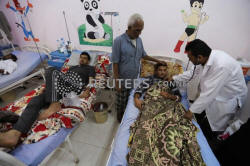 Yemen's
frontline port struggles to fight deadly fever Yemen's
frontline port struggles to fight deadly fever
 Send a link to a friend
Send a link to a friend
[January 24, 2020]
HODEIDAH, Yemen
(Reuters) - In the grounds of a bombed-out building in the port that has
become the main front of Yemen's war, workers use a hose mounted to a
truck to suck up a green, insect-filled expanse of stagnant rainwater,
then shovel in soil to fill it, trying to save lives.
|
|
 The trash-strewn pools are perfect breeding grounds for the mosquito
that spreads dengue fever, which aid workers say is killing people
every day near the frontlines in Hodeidah. The trash-strewn pools are perfect breeding grounds for the mosquito
that spreads dengue fever, which aid workers say is killing people
every day near the frontlines in Hodeidah.
War has complicated efforts to fight the world's fastest-spreading
mosquito-borne virus, wrecked Yemen's health system and public
sanitation, and made an impoverished and displaced population more
vulnerable to the disease.
In a crowded children's hospital, flies crawled over the eyes and
mouths of children struggling to breathe under the pain caused by
the virus. Walid Yahya Mansour sat with two family members; two
others had stayed home, too sick to travel.
"Dengue has been spreading fast," he said.

The World Health Organization (WHO) says the number of reported
cases of dengue fever worldwide has increased six-fold from
2010-2016. It describes the disease as one of the top 10 global
public health threats.
Dengue causes fever, headache, vomiting and pain in the muscles and
joints. A severe form can result in internal bleeding. There is no
specific treatment and no widely available vaccine yet, although one
is being trialled.
Hodeidah, which has an active frontline on its eastern edge where
the United Nations is trying to enforce a ceasefire and troop
withdrawal, is reporting the highest number of suspected dengue
cases and deaths, an International Federation of Red Cross and Red
Crescent Societies (IFRC) report said.
The WHO said 76,768 suspected cases, including 271 deaths, were
recorded last year across Yemen, although numbers started to fall in
recent weeks.
[to top of second column] |

"The dengue cases began in mid-November," said Ahmad Mu'ajam, a
doctor at Thawra hospital in Hodeidah. "With time, there were fewer
cases in the countryside areas, but they increased inside the city."
Authorities in the parts of Hodeidah city controlled by the
Iran-aligned Houthi group have been filling in pools of stagnant
water to remove mosquito breeding grounds, said Abdrahman Jarallah,
the head of Hodeidah's health department.
But frontline areas are hard to access, and most cases in Hodeidah
are coming from those areas, the WHO said. Communities there, who
collect rainwater for drinking in open basins, are being advised on
how to reduce mosquito breeding grounds themselves.
"We are getting reports of deaths on a daily basis in remote areas
of (Hodeidah)," aid organization Save The Children said last week
about dengue.
Yemen's conflict began in 2015 when a Saudi-led military coalition
intervened to try to restore the internationally recognized
government after it was ousted from power in the capital Sanaa by
the Houthi movement.
The war has killed thousands, pushed millions to the brink of famine
and also caused major cholera outbreaks.

(Reporting by Reuters team in Yemen and Lisa Barrington in Dubai;
Editing by Peter Graff)
[© 2020 Thomson Reuters. All rights
reserved.] Copyright 2020 Reuters. All rights reserved. This material may not be published,
broadcast, rewritten or redistributed.
Thompson Reuters is solely responsible for this content. |